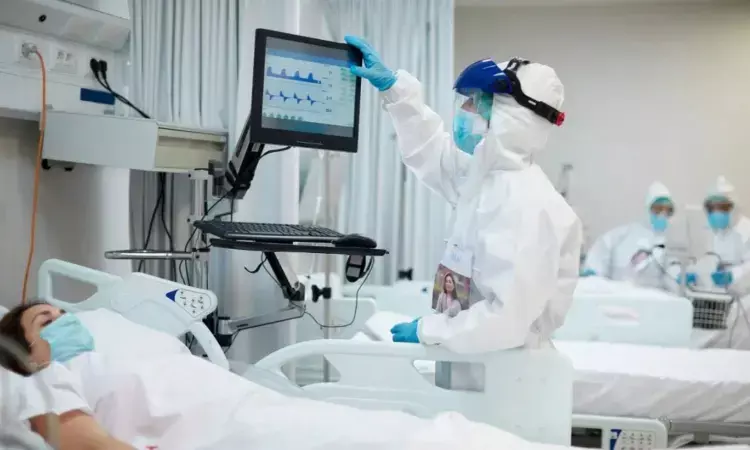- Home
- Medical news & Guidelines
- Anesthesiology
- Cardiology and CTVS
- Critical Care
- Dentistry
- Dermatology
- Diabetes and Endocrinology
- ENT
- Gastroenterology
- Medicine
- Nephrology
- Neurology
- Obstretics-Gynaecology
- Oncology
- Ophthalmology
- Orthopaedics
- Pediatrics-Neonatology
- Psychiatry
- Pulmonology
- Radiology
- Surgery
- Urology
- Laboratory Medicine
- Diet
- Nursing
- Paramedical
- Physiotherapy
- Health news
- Fact Check
- Bone Health Fact Check
- Brain Health Fact Check
- Cancer Related Fact Check
- Child Care Fact Check
- Dental and oral health fact check
- Diabetes and metabolic health fact check
- Diet and Nutrition Fact Check
- Eye and ENT Care Fact Check
- Fitness fact check
- Gut health fact check
- Heart health fact check
- Kidney health fact check
- Medical education fact check
- Men's health fact check
- Respiratory fact check
- Skin and hair care fact check
- Vaccine and Immunization fact check
- Women's health fact check
- AYUSH
- State News
- Andaman and Nicobar Islands
- Andhra Pradesh
- Arunachal Pradesh
- Assam
- Bihar
- Chandigarh
- Chattisgarh
- Dadra and Nagar Haveli
- Daman and Diu
- Delhi
- Goa
- Gujarat
- Haryana
- Himachal Pradesh
- Jammu & Kashmir
- Jharkhand
- Karnataka
- Kerala
- Ladakh
- Lakshadweep
- Madhya Pradesh
- Maharashtra
- Manipur
- Meghalaya
- Mizoram
- Nagaland
- Odisha
- Puducherry
- Punjab
- Rajasthan
- Sikkim
- Tamil Nadu
- Telangana
- Tripura
- Uttar Pradesh
- Uttrakhand
- West Bengal
- Medical Education
- Industry
Increase in Lipoprotein (a) levels during COVID-19 hospitalization tied to VTE risk: Study

Netherlands: Results from a pilot study published in the journal Atherosclerosis showed that in patients hospitalized with COVID-19, the levels of lipoprotein(a) increase threefold during hospitalization. And, an increase in Lp(a) levels during the COVID-19 acute phase was strongly linked with venous thromboembolism (VTE) incidence. In contrast to this, the change in the inflammatory biomarkers interleukin (IL)-6 and CRP was not associated with VTE incidence.
In patients with Coronavirus disease 2019 (COVID-19), thrombosis is shown to be a major driver of mortality and adverse outcomes. Hypercoagulability may be related to the cytokine storm associated with COVID-19, which is driven mainly by IL-6. An increase in Lp(a) levels following IL-6 upregulation and Lp(a) has anti-fibrinolytic properties.
Against the above background, Erik S.G. Stroes, University of Amsterdam, Amsterdam, the Netherlands, and colleagues aimed to investigate whether Lp(a) elevation may contribute to the pro-thrombotic state hallmarking COVID-19 patients.
For this purpose, the researchers measured Lp(a), IL-6, and C-reactive protein (CRP) levels in 219 hospitalized patients with COVID-19. The baseline biomarkers and increases during admission were related to VTE incidence and clinical outcomes.
Based on the study, the researchers found the following:
· Lp(a) levels increased significantly by a mean of 16.9 mg/dl in patients with COVID-19 during the first 21 days after admission.
· Serial Lp(a) measurements were available in 146 patients.
· In the top tertile of Lp(a) increase, 56.2% of COVID-19 patients experienced a VTE event compared to 18.4% in the lowest tertile (RR 3.06).
· This association remained significant after adjusting for age, sex, IL-6 and CRP increase, and a number of measurements.
· Increases in IL-6 and CRP were not associated with VTE. Increase in Lp(a) was strongly correlated with increase in IL-6 (r = 0.44).
To conclude, increases in Lp(a) levels during the acute phase of COVID-19 were strongly associated with VTE incidence. The acute increase in anti-fibrinolytic Lp(a) may tilt the balance to VTE in patients hospitalized for COVID-19.
Reference:
The study titled, "Lipoprotein(a), venous thromboembolism and COVID-19: A pilot study," was published in the journal Atherosclerosis.
Dr Kamal Kant Kohli-MBBS, DTCD- a chest specialist with more than 30 years of practice and a flair for writing clinical articles, Dr Kamal Kant Kohli joined Medical Dialogues as a Chief Editor of Medical News. Besides writing articles, as an editor, he proofreads and verifies all the medical content published on Medical Dialogues including those coming from journals, studies,medical conferences,guidelines etc. Email: drkohli@medicaldialogues.in. Contact no. 011-43720751


